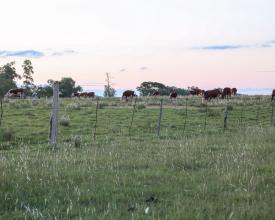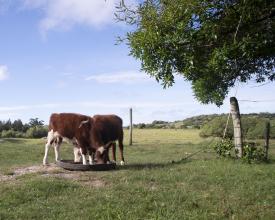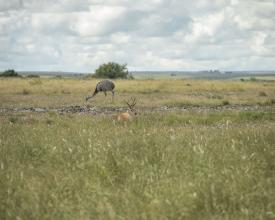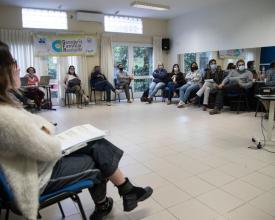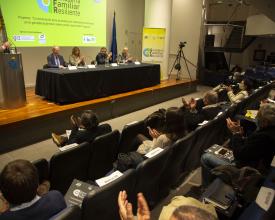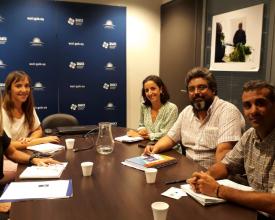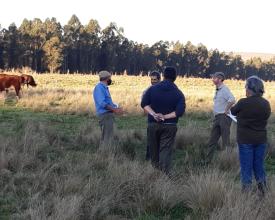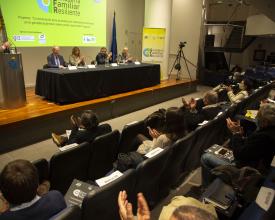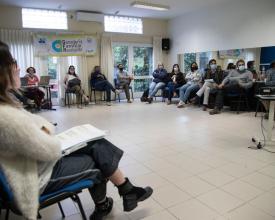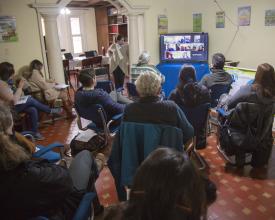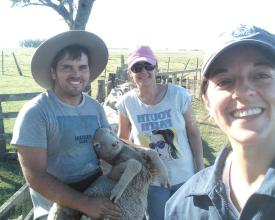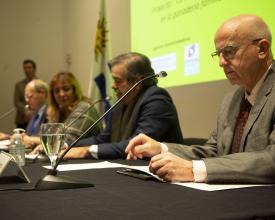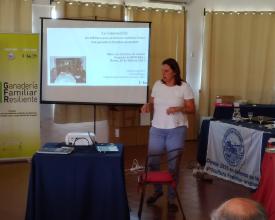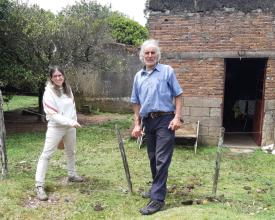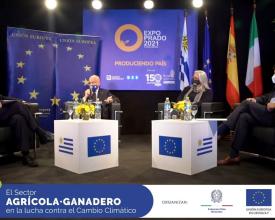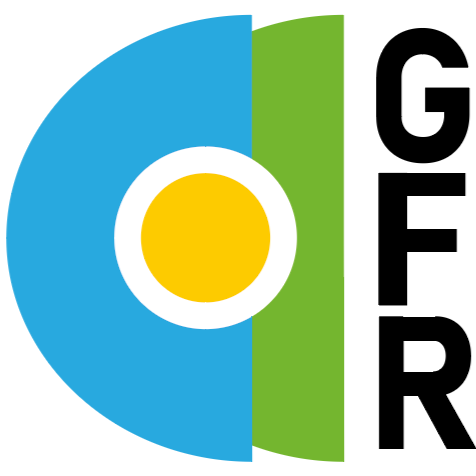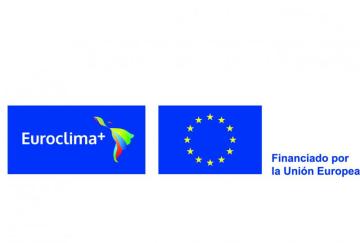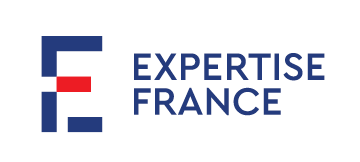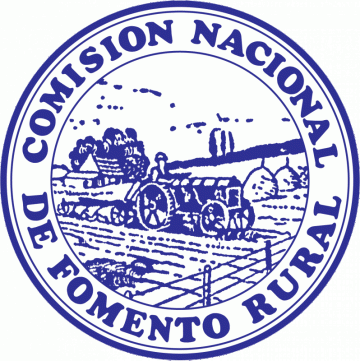
Co-innovation and best practices for climate resilience of family livestock farming in Uruguay
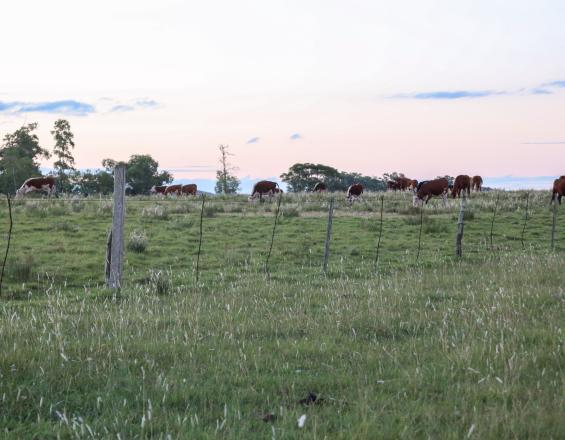
The solution corresponds to the project "Coninnovation for resilient food production in family livestock farming in Uruguay" financed by EUROCLIMA+ (EU) and executed by CNFR and INIA of Uruguay.
Co-innovation is a comprehensive on-farm technical assistance approach consisting of 4 phases: diagnosis, redesign, monitoring and evaluation. It is implemented in coordination between producer organizations and research institutes to support the implementation of validated good livestock practices (low cost and high impact) that contribute to improving the climate resilience of production systems. To this end, technical advisors visited livestock families on a monthly basis and conducted training activities with INIA and UDELAR, in strict compliance with sanitary protocols.
Dissemination was based on the use of virtual tools and social networks, which proved to be effective for communicating events, progress and results of the project.
Context
Challenges addressed
In Uruguay, extreme weather events are becoming more frequent and intense, and production systems must implement adaptation and mitigation measures.
Meat production is the most important economic activity, and 62% of family farmers are livestock producers. Most of them are located in two vulnerable agroecological regions: Basalto and Sierras del Este. Problems of scale, technical assistance and access to technologies are limited, resulting in low and unstable productivity (kg of meat/ha).
Inadequate livestock management and overgrazing cause degradation and loss of biodiversity of natural pastures, and limit animal consumption due to low supply, height and quality of pasture. They obtain reduced economic income, carbon sequestration is low, and methane emission levels per unit of product are high.
Location
Process
Summary of the process
National research institutions such as INIA and the University of the Republic of Uruguay are key in the generation of good livestock practices that favor the adaptation and resilience of family systems to climate change, contributing to their sustainability and the reduction of GHG emissions.
To develop technical assistance processes appropriate to the reality of family production, such as the co-innovation approach, it is essential that producer organizations (local and national) are an active part of these processes, in dialogue with national authorities to ensure public policy in synergy with the NDCs, as has happened in Uruguay.
The scaling up of good farming practices through the co-innovation approach to other MERCOSUR countries requires inter-institutional coordination efforts that must be assumed by the institutions of the countries, both from family production organizations and institutions linked to research, development and innovation.
Building Blocks
Co-innovation as a technical assistance approach for family production
A new vision of innovation must recognize farmers as agents capable of observing, discovering new ways of doing through experimentation and learning (Van der Ploeg, J.D. 1990). Instead of 'technology transfer' processes, thought should be given to improving farmers' ability to learn and experiment (Leeuwis, C. 1999). Therefore, innovations at the level of complex systems, in which the human being is an integral part, are no longer conceived as external but are developed and designed in their context of application and with the participation of those who manage the systems and make decisions (Gibbons, M. et al., 1997; Leeuwis, C. 1999). This ensures the relevance, applicability and adoption of potential solutions to the problems detected. The Resilient Family Farming project, based on previous experiences developed by INIA and CNFR, promoted joint work between producers, technicians, organizations and researchers, using the co-innovation approach, to generate a cyclical process of characterization and diagnosis, implementation, monitoring and evaluation that would allow innovation to emerge from interactive learning among the actors involved.
Enabling factors
- Background of CNFR - INIA articulation in the implementation of the co-innovation approach.
- The willingness of the stakeholders (producer families, leaders of local organizations, field technicians, CNFR coordinating team and INIA researchers) to implement the plan of activities in the context of a sanitary emergency.
- Good national Internet connectivity, the chain of local - national - regional and institutional links, and strict compliance with sanitary protocols.
Lesson learned
- The articulation between producers' organizations (CNFR and its local grassroots entities), INIA and the University of the Republic, demonstrated sufficient capacities to implement Co-innovation as an appropriate approach for technical assistance to family farmers, facilitating the implementation of good livestock practices that improve their climate resilience and are aligned with public policies aimed at adaptation and mitigation of climate change in livestock farming in Uruguay.
- Virtual modalities proved to be a valid and effective tool for communication between the parties, even with some existing limitations in rural territories.
- Organizations can facilitate effective communication processes with rural families, using locally available capacities and tools. Although face-to-face activities generate unique and non-transferable experiential processes, the strategies implemented in the project have been effective in an adverse context such as the COVID-19 pandemic.
Institutional coordination for scaling up technological processes in family livestock farming.
The Resilient Family Livestock project is the result of an inter-institutional articulation process that includes:
- First degree family producer organizations (6 Rural Development Societies), second degree (National Commission for Rural Development - CNFR), and third degree of regional coverage (Confederation of Family Producer Organizations of MERCOSUR - COPROFAM).
- The National Agricultural Research Institute (INIA), a public entity under private law.
- The Ministry of Livestock, Agriculture and Fisheries (MGAP), a government agency that provided political backing for the development of the action.
This network interacted with other institutions such as the University of the Republic (UDELAR), the Ministry of the Environment (MA), the Uruguayan Agency for International Cooperation (AUCI), IICA and the Delegation of the European Union in Uruguay.
Enabling factors
- Previous CNFR projects with INIA and UDELAR (co-innovation in family production).
- Existence of validated good livestock practices for family livestock production.
- Alignment with NDCs (2017): GHG mitigation, adaptation and resilience of livestock systems to climate change.
- CNFR membership in COPROFAM for scalability of co-innovation and inter-institutional articulation processes in the region.
- Access to funding sources such as EUROCLIMA+.
Lesson learned
- The development of extension actions with family livestock requires an integral methodological approach such as Co-innovation.
- The role of producers' organizations is key for the implementation of effective public policies in rural areas.
- Good livestock practices require long terms to generate results and impacts on family systems.
Resources
Impacts
52 producer families are implementing Good Livestock Management Practices (GMP) for animal management and grazing on natural pastures, associated with resilient food production and climate change adaptation, over an area of approximately 17,000 ha.
10 field technicians (agronomists and veterinarians) have been trained in the implementation of good livestock practices and the co-innovation approach, with support from INIA.
30 leaders from 6 local organizations are participating and collaborating in project dissemination activities at the local level.
More than 700 people, mostly family livestock producers, have access to information and project results through the activities and dissemination products developed.
8 organizations of MERCOSUR family farmers (linked to COPROFAM) and other institutional actors have access to project information through the Webinar "Climate change, innovation and resilient food production in family farming: Scenario of opportunities", and develop coordination actions in order to scale up and replicate the experience of co-innovation and climate resilience for family farming.
Beneficiaries
- 52 families (159 people)
-
30 leaders and 10 technicians from local organizations;
-
150 livestock producers (dissemination);
-
10 local organizations (scaling up);
-
8 organizations from 7 countries (COPROFAM);
-
Public institutions (INIA, MGAP).
Sustainable Development Goals
Story
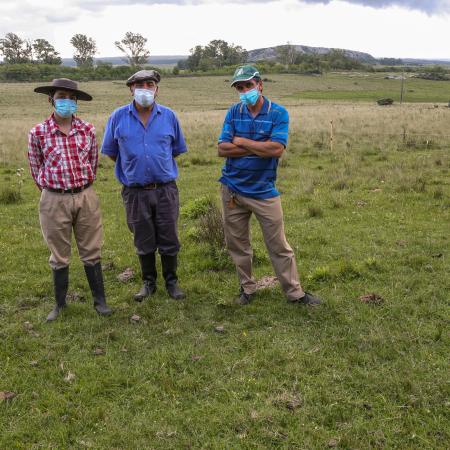
Brothers Daniel and Gonzalo Aldabalde are family livestock producers in the department of Lavalleja, in the Sierras del Este region of Uruguay, beneficiaries of the Resilient Family Livestock project.
They are members of Sociedad de Fomento Rural Ortiz, an organization that brings together hundreds of producers in that department. They have been raising cattle and sheep on natural pasture since they were small, on the land that the family has been managing for generations.
Gonzalo and Daniel have been very concerned about improving the resilience of their production system to climate change, especially to better adapt to the increasingly frequent drought situations: "Thanks to the investment fund of this project, and with the support of the technical advisor, we built an electric fence that had been planned for a long time. This allows us to divide the paddocks and make a grazing rotation, and we did it in the middle of a drought. Without these subdivisions, this management would not have been possible, which allows us to take better care of the pasture and make better use of it.
They have also highly valued the technical assistance provided by the project: "The veterinarian helped us to draw up a sanitary schedule, which we did not have... we wrote down the products we gave to the animals, but she helped us to organize ourselves to improve sanitary management".
The prospects of the two brothers are to continue working in the field in the future, with the participation of young Pía (student, Daniel's daughter) and Joaquín (Gonzalo's son).

